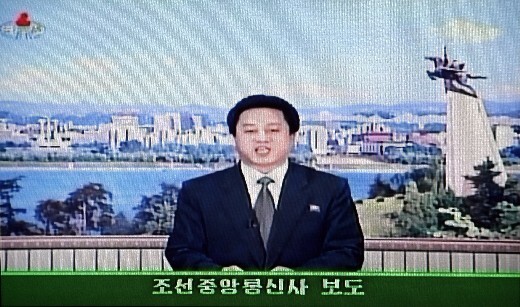hankyoreh
Links to other country sites 다른 나라 사이트 링크
N. Korea hints at possible military uses for rocket technology

The Chosun Shinbo, a newspaper published by the General Association of North Korean Residents in Japan, quickly deleted a story mistakenly published on the Internet believing that the rocket had been launched the day prior on April 4. Although it was deleted, analysts suggest it still offers an interesting perspective into how North Korea may perceive the launching of its communications satellite.
For starters, the Chosun Shinbo reported that if the international community takes a confrontational stance to this latest activity by North Korea, it could “force Pyongyang to transfer its multistage rocket technologies for military purposes.” In making reference to a “confrontational stance,” the Chosun Shinbo may have been attempting to urge the international community to reconsider the level of pressure that it applies in response to the launch. Whatever its intention, the news report displayed a tone that differs from North Korea’s. Pyongyang has claimed that the satellite launch is intended for peaceful purposes.
The newspaper also hinted that the satellite launch is intended to pave the way for talks with the U.S. “The U.S. started to step up talks with Chosun (North Korea) in the 1990s after confirming its multistage rockets,” the newspaper said, mentioning briefly the missile talks process between Pyongyang and Washington under the Bill Clinton administration.
The newspaper also mentioned economic benefits that could be garnered from developing the rocket technologies. “State-of-the art technologies can be secured through the development of rockets and various satellites. Transferring these technologies to the private sector, putting them to commercial use or selling them overseas can bring about economic benefits.” On Feb. 24, a North Korean space technology institute issued a statement saying, “In the near future, we will launch multiple satellites that can be used for practical purposes such as: communications, resource exploration, and weather forecasting.”
Analysts suggest that behind these statements, North Korea is attempting to secure the upper hand for future negotiations. Indeed, in former North Korea and the U.S. missile talks, Pyongyang had asked for cash-equivalent compensation in return for stopping exportation of its missile technologies. Washington offered to provide diverse “indirect” economic benefits. On the issue of commercialization of these satellite technologies, the U.S. also reached a tentative agreement with North Korea that it could launch the satellite instead.
Stephen Bosworth, the U.S. Special Representative for North Korea Policy, in a press conference statement on March 3 said pressure is not the only productive approach in North Korea policy, adding that incentives should also be considered.
Against this backdrop, many North Korea experts say that it is a foregone conclusion that Pyongyang and Washington will come to the negotiating table after some cooling-off period has passed. “Even after the 2006 nuclear test, sanctions on North Korea were followed by dialogues,” a high-ranking Seoul official said.
The problem is how long the cooling-off period will last. In the short-term, experts say that it will be important to see what actions the international community, including the U.S., will take and how the North will respond to their moves.
Please direct questions or comments to [englishhani@hani.co.kr]
Editorial・opinion
![[Column] Has Korea, too, crossed the Rubicon on China? [Column] Has Korea, too, crossed the Rubicon on China?](https://flexible.img.hani.co.kr/flexible/normal/500/300/imgdb/original/2024/0419/9317135153409185.jpg) [Column] Has Korea, too, crossed the Rubicon on China?
[Column] Has Korea, too, crossed the Rubicon on China?![[Correspondent’s column] In Japan’s alliance with US, echoes of its past alliances with UK [Correspondent’s column] In Japan’s alliance with US, echoes of its past alliances with UK](https://flexible.img.hani.co.kr/flexible/normal/500/300/imgdb/original/2024/0419/2317135166563519.jpg) [Correspondent’s column] In Japan’s alliance with US, echoes of its past alliances with UK
[Correspondent’s column] In Japan’s alliance with US, echoes of its past alliances with UK- [Editorial] Does Yoon think the Korean public is wrong?
- [Editorial] As it bolsters its alliance with US, Japan must be accountable for past
- [Guest essay] Amending the Constitution is Yoon’s key to leaving office in public’s good graces
- [Editorial] 10 years on, lessons of Sewol tragedy must never be forgotten
- [Column] A death blow to Korea’s prosecutor politics
- [Correspondent’s column] The US and the end of Japanese pacifism
- [Guest essay] How Korea turned its trainee doctors into monsters
- [Guest essay] As someone who helped forge Seoul-Moscow ties, their status today troubles me
Most viewed articles
- 1[Column] The clock is ticking for Korea’s first lady
- 2After 2 months of delayed, denied medical care, Koreans worry worst may be yet to come
- 3[Column] Has Korea, too, crossed the Rubicon on China?
- 4Hong Se-hwa, voice for tolerance whose memoir of exile touched a chord, dies at 76
- 5US overtakes China as Korea’s top export market, prompting trade sanction jitters
- 6[Correspondent’s column] In Japan’s alliance with US, echoes of its past alliances with UK
- 7All eyes on Xiaomi after it pulls off EV that Apple couldn’t
- 8[News analysis] After elections, prosecutorial reform will likely make legislative agenda
- 9Samsung barricades office as unionized workers strike for better conditions
- 10More South Koreans, particularly the young, are leaving their religions